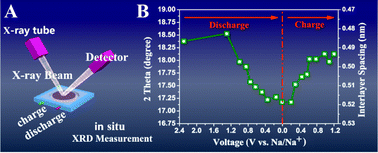Half and full sodium-ion batteries based on maize with high-loading density and long-cycle life†
Abstract
Sodium-ion batteries are especially attractive in the field of sustainable and cost-effective energy storage devices as promising alternatives to lithium-ion batteries. In this work, a lamellar carbon anode derived from biomass byproduct maize husks (LCMH) and a suitable NASICON structured Na3V2(PO4)3 cathode are utilized to assemble a full sodium-ion battery, which exhibits an extremely long cycle life of ∼1000 cycles and a high voltage of 4.1 V. More importantly, a stable reversible capacity of 239.6 mA h g−1 for the LCMH anode is obtained, along with an ultra-long cycling performance of ∼5000 cycles and a high mass loading density of 8.31 mg cm−2. Significantly, in-situ X-ray diffraction measurements are introduced to reveal the Na-storage mechanism and structure evolution upon battery cycling. This strategy provides a brand-new direction for building advanced electrode materials for full sodium-ion batteries.


 Please wait while we load your content...
Please wait while we load your content...